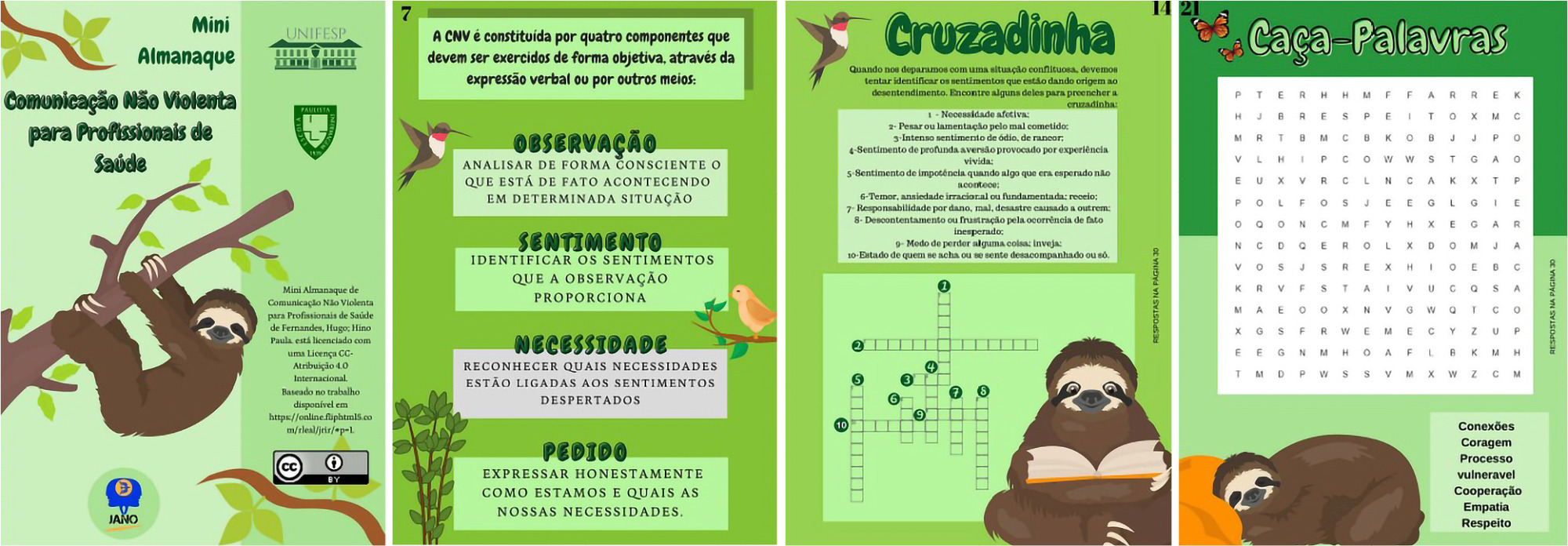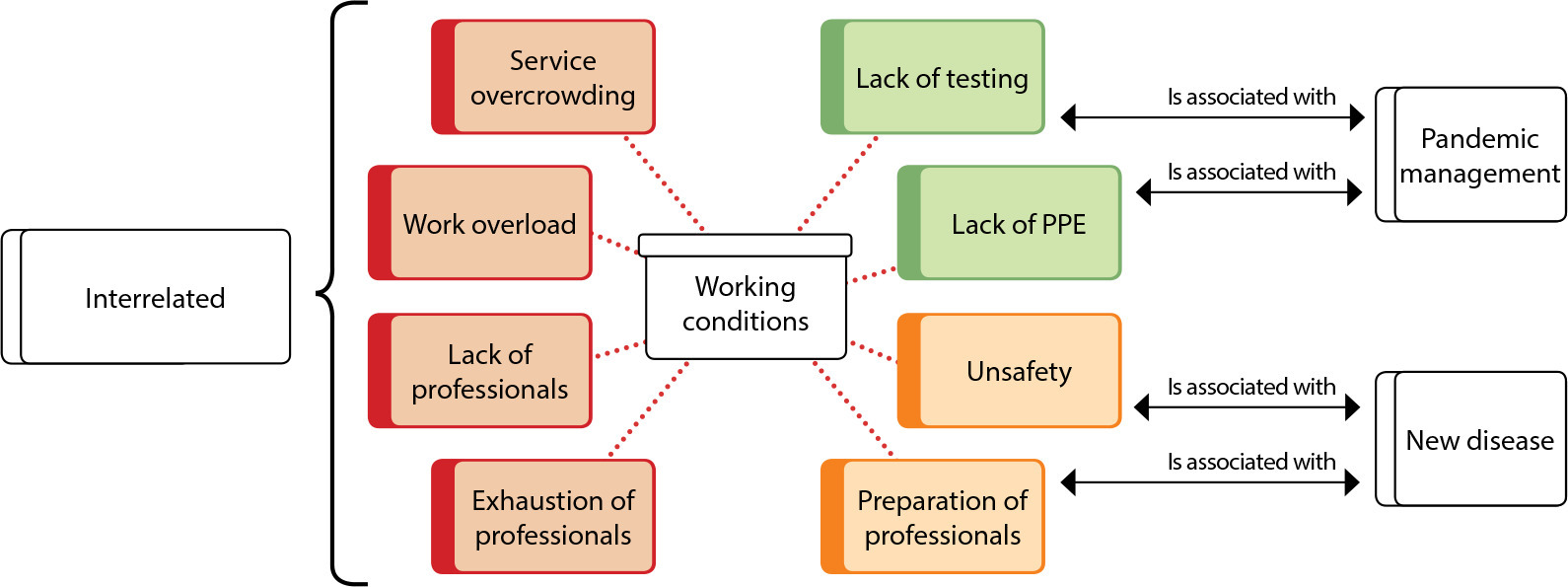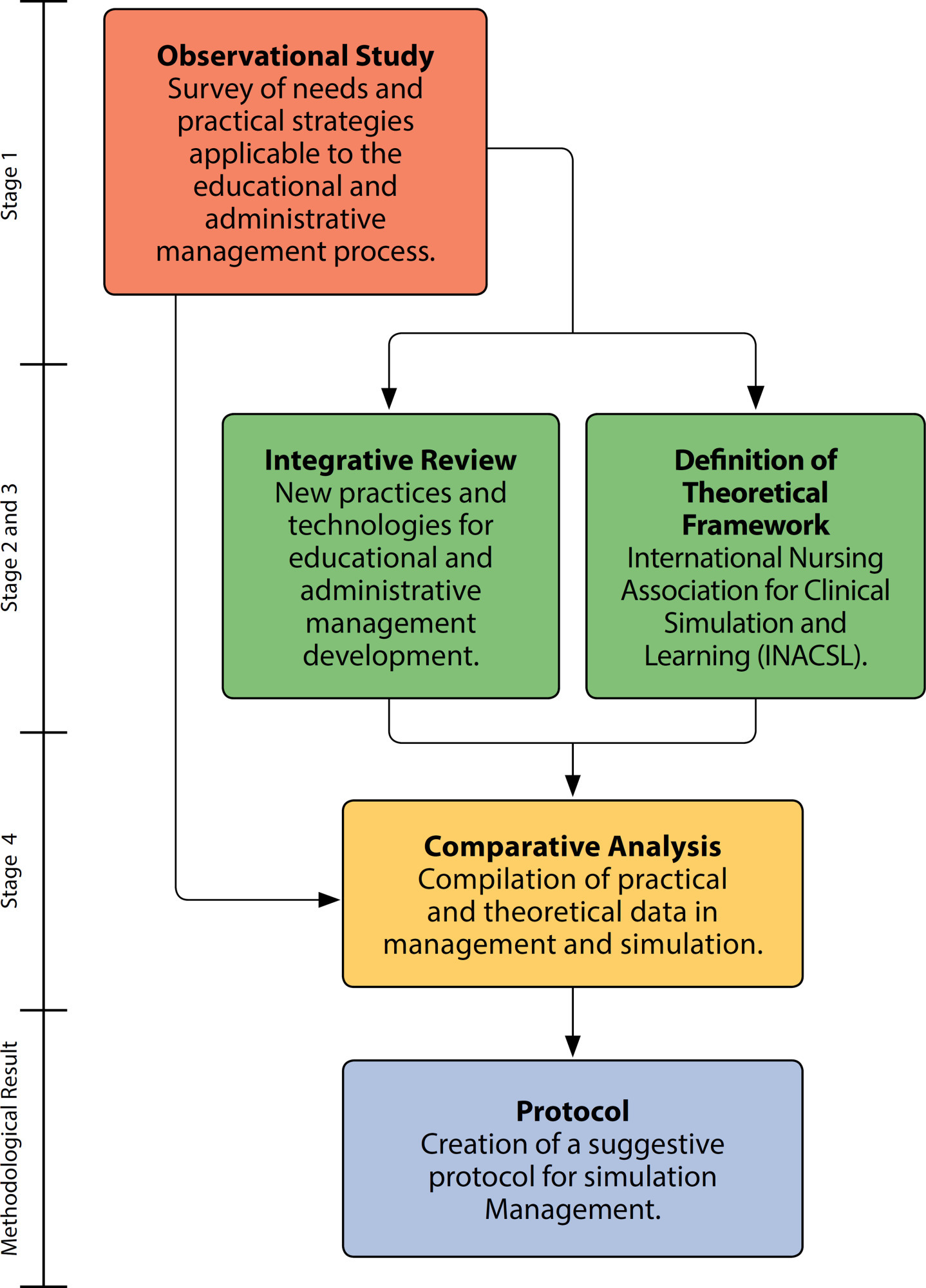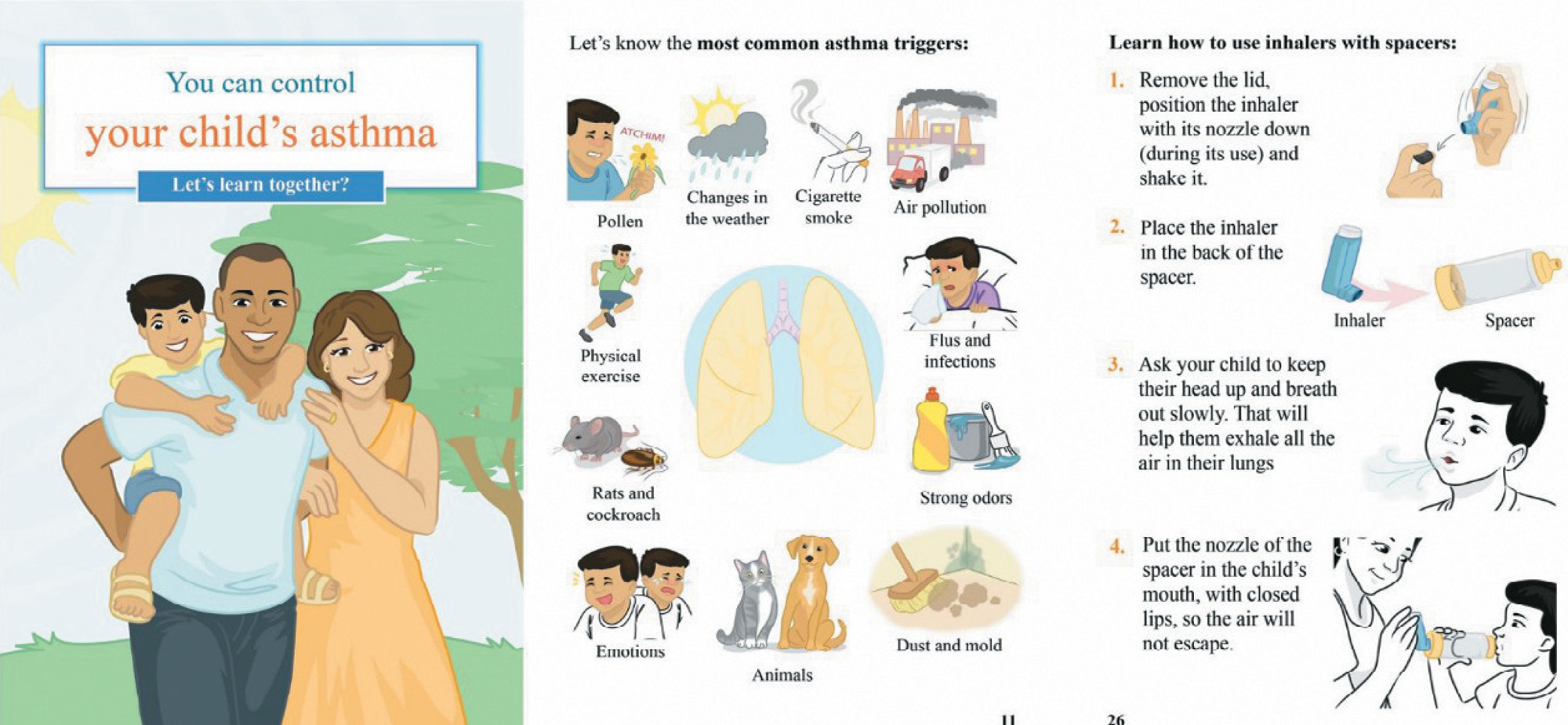-
ORIGINAL ARTICLE04-14-2023
Validity study of educational technology on gynecological high dose rate (HDR) brachytherapy
Revista Brasileira de Enfermagem. 2023;76:e20220232
Abstract
ORIGINAL ARTICLEValidity study of educational technology on gynecological high dose rate (HDR) brachytherapy
Revista Brasileira de Enfermagem. 2023;76:e20220232
DOI 10.1590/0034-7167-2022-0232
Views0See moreABSTRACT
Objective:
to construct and validate an educational booklet on high dose rate gynecological brachytherapy (HDR) for women with gynecologic cancer.
Methods:
a methodological study, with the construction and validity of a booklet based on the Doak, Doak and Root theoretical-methodological framework. Content and appearance validity was guided by the Delphi technique, by 11 judges, selected using Jasper’s criteria. Afterwards, clinical validity was carried out with the target population.
Results:
the booklet, built from evidence from an integrative review, validated with judges, obtained an overall CVI of 0.98. After clinical validity with 27 women, it presents 24 sheets with illustrations produced by a graphic designer, subdivided into topics: gynecological system anatomy and gynecological cancer epidemiology, gynecological brachytherapy definition, therapeutic steps, approach to side effects and management, and two pages for notes.
Conclusions:
the booklet has validity for use in HDR gynecological brachytherapy treatment.

-
EXPERIENCE REPORT04-14-2023
Construction of educational technology on non-violent communication between health professionals: an experience report
Revista Brasileira de Enfermagem. 2023;76:e20220414
Abstract
EXPERIENCE REPORTConstruction of educational technology on non-violent communication between health professionals: an experience report
Revista Brasileira de Enfermagem. 2023;76:e20220414
DOI 10.1590/0034-7167-2022-0414
Views0See moreABSTRACT
Objective:
to report the construction of an educational technology to promote non-violent communication for health professionals.
Methods:
an experience report on the development of an educational technology on non-violent communication for health professionals, prepared by members of a social university extension project. The Plan-Do-Study-Act cycle was used as a process or product management procedure.
Results:
two complete management method cycles were performed. A mini almanac was generated as a final product, which addressed the main elements of non-violent communication, an example of its use in everyday life, hobbies and interspersed activities.
Conclusion:
educational technology construction (mini almanac) by members of a university extension project was facilitated using the Plan-Do-Study-Act cycle, proving to be a resource for disseminating non-violent communication in health work and promoting a culture of peace.

-
ORIGINAL ARTICLE04-14-2023
Artificial intelligence in the analysis of emotions of nursing students undergoing clinical simulation
Revista Brasileira de Enfermagem. 2023;76:e20210909
Abstract
ORIGINAL ARTICLEArtificial intelligence in the analysis of emotions of nursing students undergoing clinical simulation
Revista Brasileira de Enfermagem. 2023;76:e20210909
DOI 10.1590/0034-7167-2021-0909
Views0See moreABSTRACT
Objective:
to assess nursing students’ emotions undergoing maternal-child clinical simulation.
Methods:
an observational study, carried out between June and July 2019. The Focus Group technique was used, with 28 nursing students, randomly distributed into three groups, with qualitative (Bardin technique) and quantitative data (Artificial Intelligence) analysis, to analyze emotions through facial expressions, tone of voice and description of speeches.
Results:
we defined two categories: “It was not easy, it was very stressful”; and “Very valuable experience”. In Artificial Intelligence, emotional distribution between face, voice and speech revealed a prevalence of negative valence, medium-high degree of passivity, medium power to control the situation and medium-high degree of obstruction in task accomplishment.
Final considerations:
this study revealed an oscillation between positive and negative emotions, and shows to the importance of recognizing them in the teaching-learning process in mother-child simulation.

-
ORIGINAL ARTICLE04-07-2023
The use of toys by nursing as a therapeutic resource in the care of hospitalized children
Revista Brasileira de Enfermagem. 2023;76(2):e20220433
Abstract
ORIGINAL ARTICLEThe use of toys by nursing as a therapeutic resource in the care of hospitalized children
Revista Brasileira de Enfermagem. 2023;76(2):e20220433
DOI 10.1590/0034-7167-2022-0433
Views0See moreABSTRACT
Objectives:
to describe the use of toys by nursing during the care of children in the inpatient unit; to analyze the factors that influence the use of therapeutic toys by nursing in the care of hospitalized children.
Methods:
qualitative research, conducted in a pediatric hospital in Rio de Janeiro between July and August 2019. Semi-structured interview and thematic analysis were used as methodological procedure.
Results:
the 12 nurses and 7 nursing technicians revealed minimizing fear, relieving tension, and creating a bond between the child and the professional as the main benefits; they use as resources: children’s toys, hospital materials, cartoons, and children’s videos. The high demand for work, deficit of human resources, and appropriate ludic materials are factors that interfere with the use of toys as a therapeutic resource.
Final Considerations:
although the participants recognize the importance of the toy as a therapeutic resource, there is no systematization of its use in pediatric practice.
-
ORIGINAL ARTICLE04-07-2023
Implications of the pandemic for the construction of nurses’ identity based on the journalistic media
Revista Brasileira de Enfermagem. 2023;76(2):e20220245
Abstract
ORIGINAL ARTICLEImplications of the pandemic for the construction of nurses’ identity based on the journalistic media
Revista Brasileira de Enfermagem. 2023;76(2):e20220245
DOI 10.1590/0034-7167-2022-0245
Views0See moreABSTRACT
Objectives:
to analyze the work of nurses portrayed in the journalistic media and its impact on the construction of professional nursing identity.
Methods:
this is qualitative, retrospective, descriptive and documentary research, with 51 reports from Folha de São Paulo. Time frame from March to December 2020. Thematic Content Analysis carried out from Claude Dubar’s theoretical perspective. Organization and coding of data performed with the help of ATLAS.ti®.
Results:
three categories emerged: Working conditions in the pandemic – a problem that worsened; Impacts of the pandemic on daily work; Feelings generated by the pandemic.
Conclusions:
despite adversities, such as the precariousness of health institutions, inadequate working conditions for nurses, lack of basic items of individual protection, negative feelings and hopelessness, these professionals used their knowledge, skills and innovations in the act of caring, which contributed to reconstructing their professional identity.

-
ORIGINAL ARTICLE04-07-2023
Suicide attempts by adolescents assisted in an emergency department: a cross-sectional study
Revista Brasileira de Enfermagem. 2023;76(2):e20220137
Abstract
ORIGINAL ARTICLESuicide attempts by adolescents assisted in an emergency department: a cross-sectional study
Revista Brasileira de Enfermagem. 2023;76(2):e20220137
DOI 10.1590/0034-7167-2022-0137
Views1See moreABSTRACT
Objectives:
to identify and characterize the care provided to adolescents admitted to an emergency department due to a suicide attempt.
Methods:
an observational, cross-sectional, descriptive study with a retrospective approach, carried out with medical records of adolescents aged 10 to 19 admitted for suicide attempts, between January 2015 and July 2020, in an emergency department. Data were subjected to descriptive and inferential analysis.
Results:
eighty-eight service occurrences were identified, mainly to females, exposed to multiple risk factors. Exogenous intoxication was the main method used, occurring at home and on weekdays. There were systemic repercussions, requiring multiple interventions and hospitalizations. Only 26% of cases were notified.
Conclusions:
adolescents treated for suicide attempts were exposed to multiple risk factors, with intoxication as the main means used. There is concern about the underreporting of cases and the logic of clinical care and medicalization.
-
ORIGINAL ARTICLE04-07-2023
Spiritual well-being, symptoms and performance of patients under palliative care
Revista Brasileira de Enfermagem. 2023;76(2):e20220007
Abstract
ORIGINAL ARTICLESpiritual well-being, symptoms and performance of patients under palliative care
Revista Brasileira de Enfermagem. 2023;76(2):e20220007
DOI 10.1590/0034-7167-2022-0007
Views0See moreABSTRACT
Objectives:
to assess the relationship between spiritual well-being, symptoms and performance of patients under palliative care.
Methods:
this is a descriptive correlational study, conducted with 135 patients seen in palliative care outpatient clinics. Karnofsky Performance Status Scale, Edmonton Symptom Assessment Scale, Spirituality Scale and Hospital Anxiety and Depression Scale were used. Data were submitted to descriptive statistical analysis and Spearman’s correlation.
Results:
among participants, 68.2% were cancer patients. The most prevalent symptoms were changes in well-being (65.2%), anxiety (63.7%), sadness (63%) and fatigue (63%). Sadness, dyspnea, sleepiness, anxiety and depression presented weak to moderate correlation with spiritual well-being. Symptom overload showed weak negative correlation with performance.
Conclusions:
symptom intensification was correlated with worsening in spiritual well-being perception. The reduction in performance was related to increased number of symptoms, especially depression and anxiety.
-
REVIEW04-07-2023
Analysis of moral courage and related factors among undergraduate nursing students: a scoping review
Revista Brasileira de Enfermagem. 2023;76:e20220225
Abstract
REVIEWAnalysis of moral courage and related factors among undergraduate nursing students: a scoping review
Revista Brasileira de Enfermagem. 2023;76:e20220225
DOI 10.1590/0034-7167-2022-0225
Views0See moreABSTRACT
Objective:
to analyze scientific evidence on moral courage and related factors among nursing undergraduate students.
Method:
the protocol of this scoping review was registered on Open Science Framework. A search was performed in five databases, according to the method provided by Joanna Briggs Institute Reviewers, the mnemonic strategy Population, Concept and Context, and a specific checklist.
Results:
a total of 2,812 results were identified, but only nine studies were eligible and presented three thematic approaches: Moral courage from the perspective of nursing students; Moral courage and related factors; and The teaching of moral courage in the training of nursing students. The factors related to moral courage include moral distress, moral sensitivity, age, and having a previous degree in the health field.
Final Considerations:
few studies were found with a low evidence level. Most were performed in developed countries, indicating some gaps that need to be addressed in the future.

-
ORIGINAL ARTICLE02-03-2023
Quality of life and satisfaction of students with auriculotherapy in the covid-19 pandemic: a quasi-experimental study
Revista Brasileira de Enfermagem. 2023;76:e20220522
Abstract
ORIGINAL ARTICLEQuality of life and satisfaction of students with auriculotherapy in the covid-19 pandemic: a quasi-experimental study
Revista Brasileira de Enfermagem. 2023;76:e20220522
DOI 10.1590/0034-7167-2022-0522
Views0See moreABSTRACT
Objectives:
to evaluate the quality of life before and after the application of auriculotherapy and the satisfaction of university students with the treatment during the covid-19 pandemic.
Methods:
quasi-experimental study conducted with 44 students in a University Health Center. The intervention consisted of ten sessions of auriculotherapy focusing on emotional changes with quality of life assessment before and after treatment. The study also investigated the satisfaction concerning the intervention.
Results:
predominated among the students: women, from health courses, in use of psychotropic drugs and complaining of emotional changes. There was a statistically significant increase in all domains of quality of life, and students were satisfied with the treatment.
Conclusions:
auriculotherapy improved the quality of life of university students during the covid-19 pandemic, and the level of satisfaction with the treatment was high.
-
ORIGINAL ARTICLE08-16-2021
Management in clinical simulation: a proposal for best practices and process optimization
Revista Brasileira de Enfermagem. 2021;74:e20200515
Abstract
ORIGINAL ARTICLEManagement in clinical simulation: a proposal for best practices and process optimization
Revista Brasileira de Enfermagem. 2021;74:e20200515
DOI 10.1590/0034-7167-2020-0515
Views0See moreABSTRACT
Objectives:
to develop a best practices document with facilitating components and processes for simulation management.
Methods:
the methodological research was conducted between April and October 2017, using four approaches: observational research, conducted in an international simulation institution; Definition of theoretical framework, from the International Nursing Association for Clinical Simulation and Learning; integrative literature review, in international databases; and comparative analysis. It used Bardin’s analysis for the categorization of the information.
Results:
creation of a document with good practices in simulation regarding management and practice in simulation and management of resources and data, highlighting the use of technology and the training of professionals as the most important allies for overcoming the main limitations found.
Final Considerations:
the product of this study is a compilation of strategies for simulation management as a tool to enhance the application of the method with greater effectiveness.

-
ORIGINAL ARTICLE08-19-2019
Health promotion by nursing technicians from the nurses’ perspective
Revista Brasileira de Enfermagem. 2019;72(4):979-987
Abstract
ORIGINAL ARTICLEHealth promotion by nursing technicians from the nurses’ perspective
Revista Brasileira de Enfermagem. 2019;72(4):979-987
DOI 10.1590/0034-7167-2018-0552
Views0See moreABSTRACT
Objective:
to analyze education and practice of nursing technicians in health promotion, from the perspective of teaching nurses of technical course and Primary Health Care nurses.
Method:
an exploratory study with qualitative data analysis, carried out in the city of São Paulo, through semi-structured interviews with nine public technical professors and 16 nurses from the basic health network. Data thematic analysis was carried out.
Results:
three thematic categories have emerged: Conceptions and experiences on health promotion; Nursing technician’s practice in health promotion; and Nursing technician education on health promotion.
Final considerations:
it is necessary to review the centrality given to technicalism in the education and practice of nursing technicians, contemplating the health promotion and seeking the development of professional competence for the construction of transformative practices aimed at valuing the autonomy and proactivity of the people in health and quality of life production.
-
REFLECTION02-15-2021
The belief in health in the adoption of COVID-19 prevention and control measures
Revista Brasileira de Enfermagem. 2021;74:e20200576
Abstract
REFLECTIONThe belief in health in the adoption of COVID-19 prevention and control measures
Revista Brasileira de Enfermagem. 2021;74:e20200576
DOI 10.1590/0034-7167-2020-0576
Views0See moreABSTRACT
Objective:
Reflect, in the light of the Health Belief Model, on the adoption of behavioral measures in the context of COVID-19.
Methods:
Theoretical-reflective essay, based on the Health Belief Model, to reflect on adherence to preventive behaviors in the pandemic of COVID-19.
Results:
Adherence to preventive behaviors is strongly influenced by socioeconomic, territorial, political and individual factors in the face of critical health situations. In addition, the spread of false news modulates the thinking and execution of behavioral actions in the population.
Final Considerations:
It is necessary to understand the importance of health communication processes and the use of tools aimed at responsible human behavior and engaged in the adoption of a preventive posture.
-
ORIGINAL ARTICLE04-07-2023
Suicide attempts by adolescents assisted in an emergency department: a cross-sectional study
Revista Brasileira de Enfermagem. 2023;76(2):e20220137
Abstract
ORIGINAL ARTICLESuicide attempts by adolescents assisted in an emergency department: a cross-sectional study
Revista Brasileira de Enfermagem. 2023;76(2):e20220137
DOI 10.1590/0034-7167-2022-0137
Views1See moreABSTRACT
Objectives:
to identify and characterize the care provided to adolescents admitted to an emergency department due to a suicide attempt.
Methods:
an observational, cross-sectional, descriptive study with a retrospective approach, carried out with medical records of adolescents aged 10 to 19 admitted for suicide attempts, between January 2015 and July 2020, in an emergency department. Data were subjected to descriptive and inferential analysis.
Results:
eighty-eight service occurrences were identified, mainly to females, exposed to multiple risk factors. Exogenous intoxication was the main method used, occurring at home and on weekdays. There were systemic repercussions, requiring multiple interventions and hospitalizations. Only 26% of cases were notified.
Conclusions:
adolescents treated for suicide attempts were exposed to multiple risk factors, with intoxication as the main means used. There is concern about the underreporting of cases and the logic of clinical care and medicalization.
-
ORIGINAL ARTICLE09-07-2020
Profile and entrepreneurial intention of nursing students: a comparison between Brazil and Chile
Revista Brasileira de Enfermagem. 2020;73(6):e20190890
Abstract
ORIGINAL ARTICLEProfile and entrepreneurial intention of nursing students: a comparison between Brazil and Chile
Revista Brasileira de Enfermagem. 2020;73(6):e20190890
DOI 10.1590/0034-7167-2019-0890
Views0See moreABSTRACT
Objective:
to identify and compare factors associated with profile, intentions, motivations, and barriers to entrepreneurial behavior of nursing students from Brazil and Chile.
Methods:
this cross-sectional study was carried out between March and September 2018 including 889 nursing students. A form was used to assess the socio-demographic profile, professional claims, entrepreneurial intentions and motivations. Statistical analysis used Chi-Square and Fisher’s Exact tests, with a 5% significance level, and a simple logistic regression model.
Results:
there are significant differences between countries in the profile of students and in the motivations studied, but not in professional pretensions and entrepreneurial intentions. Lack of education on the subject reveals itself as an important barrier to entrepreneurship.
Conclusion:
given the lack of teaching entrepreneurship in undergraduate nursing courses and the characteristics inherent to students, education must be appropriate to different cultures to prepare future professionals for other areas of practice.
-
REVIEW10-05-2020
Self-efficacy of health professionals in hand hygiene practice: is it possible to measure?
Revista Brasileira de Enfermagem. 2020;73:e20190873
Abstract
REVIEWSelf-efficacy of health professionals in hand hygiene practice: is it possible to measure?
Revista Brasileira de Enfermagem. 2020;73:e20190873
DOI 10.1590/0034-7167-2019-0873
Views0See moreABSTRACT
Objective:
To identify in the literature the tools used to measure self-efficacy of health professionals in hand hygiene.
Methods:
Integrative literature review carried out by consulting the databases PubMed, Scopus, Web of Science, Cumulative Index to Nursing and Allied Health Literature, Europe PubMed Central, and Science Direct using the descriptors Self Efficacy, Hand Hygiene, and Health Personnel.
Results:
Six articles, all of which with observational design, were selected. It was possible to infer that four studies used validated instruments to measure self-efficacy of health professionals in the conformity with the recommendations for hand hygiene. The other studies used questionnaires that were not validated.
Final considerations:
Despite the extensive literature on hand hygiene, there is a lack of scientific evidence regarding the use of validated instruments to measure self-efficacy of health professionals in the procedure. The use of properly validated psychometric instruments is useful to guarantee the quality of results in studies.

-
ORIGINAL ARTICLE05-24-2021
Content validation of an educational booklet for asthma control and management in children
Revista Brasileira de Enfermagem. 2021;74:e20200353
Abstract
ORIGINAL ARTICLEContent validation of an educational booklet for asthma control and management in children
Revista Brasileira de Enfermagem. 2021;74:e20200353
DOI 10.1590/0034-7167-2020-0353
Views0See moreABSTRACT
Objective:
to validate the content and appearance of the educational booklet “You can control your child’s asthma – let’s learn together?” with parents and caregivers of children with asthma.
Methods:
this is a methodological study, carried out with 34 mothers and caregivers of children, from two to 10 years old, diagnosed with asthma. The educational booklet validation was performed using Content Validity Index (CVI) and assessment of comprehension, attractiveness, self-efficacy, persuasion, and cultural acceptance domains.
Results:
the booklet was considered clear (99.8%) and relevant (100%), with a global CVI of 0.99. Domain assessment proved to be an easy-to-understand tool, culturally appropriate, attractive, with persuasive power and promoting self-efficacy.
Conclusion:
the booklet is valid and adequate for promoting the self-efficacy of parents and caregivers in childhood asthma control and management, potentially scalable to other realities of outpatient care.

Search
Search in:
Nuvem de Tags
Adolescente (85) Atenção Primária à Saúde (239) COVID-19 (91) Criança (91) Cuidados de Enfermagem (269) Educação em Enfermagem (151) Educação em Saúde (139) Enfermagem (930) Enfermagem Pediátrica (86) Estudantes de Enfermagem (77) Estudos de Validação (131) Família (87) Idoso (208) Promoção da Saúde (99) Qualidade de Vida (104) Saúde do Trabalhador (86) Saúde Mental (145) Saúde Pública (82) Segurança do Paciente (150) Tecnologia Educacional (100)



